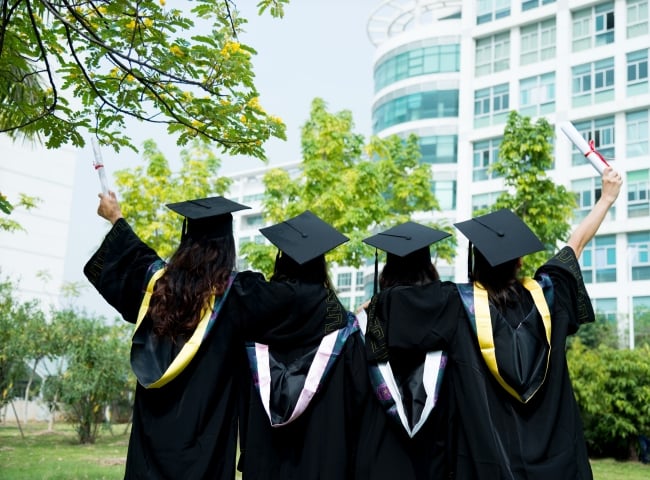You have /5 articles left.
Sign up for a free account or log in.

A small number of students choose to re-enroll at their alma mater for graduate school each year. Here are some common challenges and obstacles those learners face and how to address them.
baona/iStock/Getty Images
Starting graduate school can be a challenging transition for students, even those who are continuing their education at the same institution where they received their bachelor’s degree.
Recent research from Seth M. Fishman, assistant dean of curriculum and assessment and associate professor of education at Villanova University, can help higher ed professionals understand the experiences of students who re-enroll at the same university for their graduate degree program, what he calls an “academic encore.”
Through interviews with current graduate students at a four-year liberal arts university in the Northeast, Fishman learned that students often assumed the transition would be easier than it was, highlighting a need for more institutional support measures and insight into how the graduate experience differs from undergraduate.
The background: Fundamentally, graduate education looks different from bachelor’s degree programs, with more independent work, smaller cohorts and a wider range of lived experiences and ages among those enrolled in the program.
Students who return to their alma mater for a master’s degree program often assume that their previous experiences will better prepare them for this next chapter of postsecondary education, Fishman says. Overconfidence bias can cause students to make assumptions about their experiences that do not hold true.
Instead, students say they feel more isolated or more behind compared to their peers. Often, these students are the only or one of a few taking an academic encore in their program, so they don’t have the same faces and social circle they had as undergraduates. Walking around campus, students feel a heightened sense of isolation because of a lack of familiar faces or encounters with lower-level students who ask, “Didn’t you graduate?” students shared with Fishman.
Their routines are also different—not eating in the cafeteria or participating in student organizations, but instead taking night classes, working more closely with faculty members and learning alongside a peer group with ranging ages.
Who stays? In interviews, many students shared they hadn’t thought about graduate school until someone at the university shared that it could be a good fit for them. This speaks to the power and influence of faculty and staff to identify talented students, Fishman says.
Another key factor was funding and the financial support they received from their alma mater. Many students with prior relationships to faculty members knew they would have a paid role if they stayed, either continuing in their lab or taking on a graduate assistance position or something similar.
A less clear motivator was how the COVID-19 pandemic influenced students to stay on campus and regain lost time or experiences at their alma mater. Students also spoke of the convenience and familiarity of returning to the campus, having already spent significant time navigating it and the surrounding area. Some returners had established roots on or near campus, such as having developed a trusted therapist relationship, having family members nearby or working in a continuing research partnership.
Though Fishman did not interview an international student on a visa, that is another population who could be more motivated to complete an academic encore to reduce the logistics of completing visa requirements or other paperwork, he says.
Making the transition: To help students transition into their graduate programs, higher education leaders can:
- Highlight opportunities for undergraduate students. As noted in student interviews, many returners didn’t know about the opportunities present at their alma mater. A graduate studies fair or similar programming can make these pathways more visible to learners and help institutional leaders target students with programming and support as they re-enroll.
- Build academic pathways. Many colleges and universities offer a B.A./M.A. or B.S./M.S. program that allows undergraduate students to continue their studies into a graduate degree program, typically by adding on one more year of courses. Institutions can build on this strategy to create a pipeline for talented students who want to complete graduate education while ensuring they’re supported throughout their graduate experiences.
- Centralize support. While students may be familiar with the physical campus, graduate student academic supports are often different from those of undergraduate students. Creating a one-stop shop for graduate students to meet with staff, hang out and receive help can bolster a student’s sense of belonging and get them plugged in with new resources. Some resources follow students, such as disability accommodations or counseling support, so finding ways to transition student information from their undergraduate to graduate programs is also key.
- Spotlight differences. Students, overwhelmingly, said they underestimated how different their experiences would be. Having a student panel during orientation or student mentorship initiative that pairs returning students with peers who also are doing an academic encore can provide insight into the experience and provide advice.
Advice to give: To guide students as they transition, Fishman offers some insight into how to make the most of an academic encore.
- Treat it like it’s new. Some students said they skipped orientation sessions or didn’t bother to engage in preterm activities because they already felt acclimated to the campus, which they later regretted. Instead, practitioners should encourage students to act as though they’re adjusting to a brand-new institution to set expectations and help with the adjustment.
- Visit academic supports. Graduate students said they were more likely to go to the library, check out books and conduct research using campus facilities during their later years compared to their first four at the university. One such resource was the speech and presentation lab, which benefited students as they learned to deliver a presentation in class.
- Engage outside the classroom. Finding community and getting plugged in to the university takes time, even as a returning student. Graduate student organizations can help students build their professional networks and meet people outside of their department or program.
Seeking stories from campus leaders, faculty members and staff for our Student Success focus. Share here.




